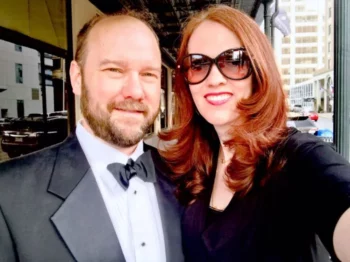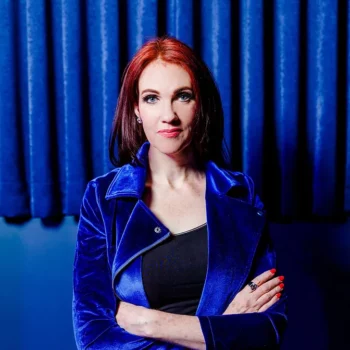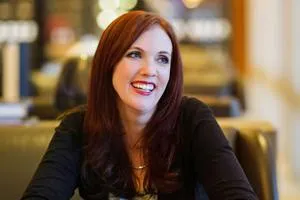As a mischievous atheist in the 4th grade, Jennifer Fulwiler moved all the Bibles in her school library into the fiction section.
Her bedtime stories were about the stars, the cosmos, the universe. Science was her god and Carl Sagan was her Bible.
But all that changed when she had a baby.
“When I held that baby, that was the first moment I realized there were some real problems with atheism and that it was time to address them,” Jennifer says in a Daily Dose of Wisdom video on YouTube.

Today, Jennifer Fulwiler is a Catholic comedian. Her journey to faith was fraught with irony. Her dad, an atheist, had told her to seek truth and question assumptions. This led her to Christ.
The problems with Jennifer’s atheism cropped up in college.
An atheist professor at the University of Texas at Austin had said, “It would be more morally acceptable to kill a newborn baby than an adult pig because pigs are more cognitively complex.”
That disturbed her.
Another thing that professors said was that people believed in God only as a superstition before they had science. Fulwiler has since studied a bit of the history of science and philosophy and knows this is a modern fiction.
 She found other holes. An atheist friend said humans have a gene to work and collaborate in community. This theory, however, contradicts the whole of evolutionary theory, namely, the idea of survival of the fittest.
She found other holes. An atheist friend said humans have a gene to work and collaborate in community. This theory, however, contradicts the whole of evolutionary theory, namely, the idea of survival of the fittest.
“From a purely atheist materialist perspective, you could also concoct a moral code in which beating up the weak and the poor and stealing their stuff so that you can get rich and your offspring can survive,” she points out. “It seems like that could also be perfectly justifiable from an atheist materialist perspective.”
When she asked these questions among atheists, the common response was “shut up.”
Then she married and had a baby, “an amazing miracle,” she says. When she held her newborn, she marveled.
“What a gorgeous randomly evolved set of chemical reactions.” Suddenly, these words seemed stark, unfeeling and bizarre, but they squared 100% with atheism.
“I looked at my newborn son and thought, Well, pigs are pretty smart. Pigs are more cognitively complex than this newborn,” she mulled.
“That’s when I realized my own atheist, materialist worldview was saying that a baby was not as valuable as an adult human being,” she realized. “That was so wrong. I sensed this love that I felt for him. Does this love I’m feeling come from just chemical reactions?”
The love she experienced was WAY beyond just chemical reactions. She sensed it was transcendent.
“I know that the love that I feel for my son and that I’ve experienced in this little family of ours has a source that is somewhere outside of us,” she now says.
The atheist worldview was beginning to erode.
Seven months later, she walked into a bookstore. She still wasn’t a Christian. Her ideas had only begun to shift.
“It was like there was this light on this one book at the back of the room,” Jennifer says. “I was so drawn to this book. I had to go see what it was.”
It was The Case for Christ by Lee Strobel.
She laughed. It would be fun to pick apart the arguments, she thought.
She purchased the book. She didn’t find herself picking apart arguments. Instead, she got convinced by them.
“This guy (author Lee Strobel) spoke my language,” she admits. “He made some points that got me thinking.”
One of them: Millions of Jews throughout history remain faithful to their customs and preserve themselves as a people despite persecution, genocide, threats, etc. “These Jews believe to abandon these institutions would risk their souls being damned to Hell,” she recounts.
But after the death of a lower-class rabbi named Jesus, 10,000 Jews left Judaism and give up the customs (temple, sacrifice, and Sabbath) to follow him. For that to have happened, “you have to admit that something explosive happened to Jewish culture in the first century,” she says.
“His explanation was that simply they had seen Jesus resurrected,” she says. Jennifer accepted Jesus.
Jennifer is no longer the mischievous atheist that she was in the fourth grade. She’s a Christian planting seeds for the Gospel wherever she goes.
If you want to know more about a personal relationship with God, go here
About the writer of this article: Liyat Belay lives in Los Angeles and studies at the Lighthouse Christian Academy.




